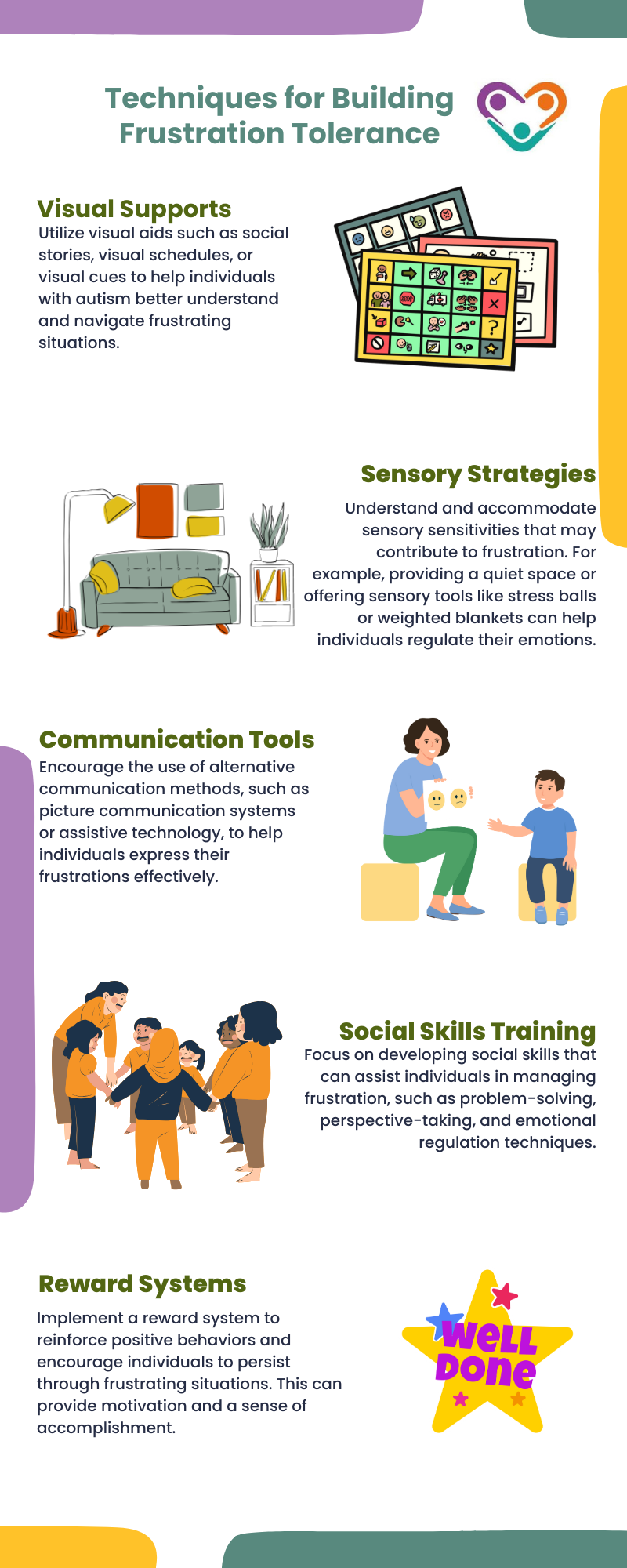Frustration tolerance plays a crucial role in the emotional well-being and overall development of autistic individuals. Children with ASD may experience heightened levels of frustration due to various factors, including sensory sensitivities, difficulty with communication, and challenges in social interactions.
Understanding and addressing frustration tolerance is essential for parents and caregivers in supporting individuals with autism.
In this guide, we’ll look at what frustration tolerance is and go through certain strategies for building it.
What is Autism Frustration Tolerance?
Frustration tolerance is the ability to handle and manage feelings of frustration in the face of challenges and obstacles.
For individuals with autism, frustration may arise from difficulties in communication, sensory sensitivities, and the need for routine and predictability. When these challenges become overwhelming, it can lead to increased frustration, anxiety, and even meltdowns.
It is important to note that frustration is a natural emotional response, and individuals with autism are not more prone to frustration than others. However, the unique nature of autism may intensify these feelings and make it more challenging for individuals to regulate their emotions.
Impact on Emotional Well-being
Low frustration tolerance can have a significant impact on the emotional well-being of individuals with autism. It can lead to increased stress, anxiety, and a sense of helplessness.
Difficulties in managing frustration may also affect social interactions, as individuals with autism may struggle to cope with unexpected changes or misunderstand others’ emotions.
Furthermore, frustration tolerance is closely linked to learning abilities. When individuals become overwhelmed by frustration, their ability to concentrate, problem-solve, and persevere through difficulties may be compromised.
This can hinder their academic progress and overall development.
Understanding the conditions associated with frustration tolerance, such as autism, can help parents and caregivers navigate their child’s unique challenges. By recognizing the impact of frustration on emotional well-being and learning, they can seek appropriate support and create an environment that fosters resilience, patience, and emotional growth.
Strategies for Building Frustration Tolerance
Building frustration tolerance in individuals with autism requires specific strategies that take into account their unique needs and challenges. Through the help of these strategies, parents and caregivers can help individuals with autism develop the skills necessary to navigate and cope with frustration effectively.
Let’s look at each of them.
Patience and Understanding
Patience is a key virtue when it comes to supporting individuals with autism in building frustration tolerance. It’s important to remember that individuals with autism may process and react to frustration differently than neurotypical individuals. They may require more time to process their emotions and find appropriate ways to express themselves.
By practicing patience, caregivers create a supportive environment that allows individuals with autism to feel safe and understood. Offering reassurance, actively listening, and providing space for them to express their frustrations can help foster a sense of trust and emotional security.
Personalized Support Techniques
Individuals with autism have unique strengths, challenges, and preferences. Personalized support techniques tailored to their specific needs can greatly enhance their frustration tolerance.
Here are some strategies to consider:

Building frustration tolerance in individuals with autism is a gradual process that requires patience, understanding, and personalized support techniques. By implementing these strategies, parents and caregivers can help individuals with autism navigate frustration more effectively.
Importance of Frustration Tolerance
Frustration tolerance plays a significant role in the lives of individuals with autism. It encompasses the ability to handle and manage feelings of frustration when faced with challenges or obstacles.
Developing and enhancing frustration tolerance is crucial for long-term success and emotional regulation. It helps individuals learn to maintain persistence in the face of adversity, manage disappointments, and stay focused on their long-term goals.
When individuals with autism have a higher frustration tolerance, they are better equipped to navigate the complexities of life. They are more likely to persevere through challenges, problem-solve effectively, and develop the skills necessary to achieve their goals.
Building frustration tolerance sets the foundation for long-term success and growth.
Challenges with Frustration Tolerance
Unfortunately, individuals with autism often face unique challenges when it comes to frustration tolerance.
They often exhibit a low frustration tolerance and an inability to effectively modulate their own emotions. This means that they may have difficulty controlling and regulating their emotional responses, which can lead to rapid escalation to extreme anger or frustration without provocation.
It is important to note that individuals with high-functioning ASDs may struggle to accurately describe their emotions, often only able to identify emotional extremes. This difficulty in modulating anger can be a significant source of frustration for individuals with autism, as they may find it challenging to manage their emotions in a socially appropriate manner.
Another common challenge for individuals with autism is interpreting the emotions of those around them. They may have difficulty understanding and recognizing the emotions expressed by others, making it challenging for them to navigate social interactions effectively.
This difficulty in interpreting others’ emotions can contribute to misunderstandings and difficulties in building and maintaining relationships.
To support individuals with autism in overcoming these challenges, it is important to provide them with the necessary tools and strategies to develop emotional awareness and regulation skills.
Visual supports, such as an “emotions thermometer,” can help individuals with autism identify and understand emotions on a spectrum rather than just extremes. Teaching individuals with autism how to correctly identify their own emotions and those of other people can also be beneficial in improving their frustration tolerance and social interactions.

Final Thoughts
Building frustration tolerance in autism takes time, patience, and the right strategies. By creating a supportive environment, encouraging self-regulation, and celebrating small victories, you can help someone with autism grow stronger in managing frustration.
Remember, progress may be slow, but with consistent effort, each step forward leads to greater resilience and a brighter future.
Keep supporting, keep encouraging, and watch as frustration becomes a hurdle that can be overcome. If you’re in need of additional support, Golden Care Therapy offers comprehensive ABA services in New York, New Jersey, Georgia, and Indiana. Contact us today to learn how we can help your loved one thrive.



